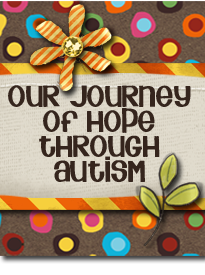Hi all :)
Well this report just came out today! It makes me so sad that our wonderful country is so behind on getting the most current information out to the public. Read on its very interesting!
U.K. Autism Study Finds Prevalence 1-64
By: Carin Yavorcik
Autism Society Welcomes New Studyand Calls for Continued Focuson Supporting People with Autism in America.
A new study by researchers in the United Kingdom finds that the prevalence of autism in that country is much higher than previously thought. The current estimate of autism in the U.K. is one in 100. But the new study, led by Professor Simon Baron-Cohen of the Autism Research Centre at Cambridge University, found that for every three diagnosed cases of autism, there are two that are not diagnosed meaning the true prevalence in the U.K. could be as high as one in 64.
The Autism Society applauds this research and hopes to see similar studies done in the United States to help address the comprehensive need for services to support individuals with autism across the spectrum.
“The data from this British study reflects what we are also seeing here on the ground in America,” said Autism Society President and CEO Lee Grossman. “We believe the incidence rates here are approaching those in the United Kingdom. In the U.S. educational system, states are reporting higher prevalence even with coding differences among states. There has been an unanswered and urgent need for services and supports for people with autism for decades, and we need to act now to serve.” Mr. Grossman is also a public member of the Interagency Autism Coordinating Committee of the U.S. government.
In the United States, where current estimates place the prevalence of autism at one in 150, the Autism Society hears from many families whose children still have difficulty getting a diagnosis and adults who have never been identified. Reports from the state of Indiana indicate the current rate of identification in students is one in 101, and does not include children who are home-schooled or educated in private institutions, according to the Indiana Resource Center for Autism.
The U.S. Centers for Disease Control and Prevention are expected to release updated estimated prevalence rates this year.“Perhaps the most important issue raised by the Cambridge study is not simply the higher prevalence rate of autism but, rather, the tremendous heterogeneity in its expression,” said Dr. Edward Carr, Leading Professor, Department of Psychology, State University of New York at Stony Brook and a member of the Autism Society’s Applied Research team. “That means that more and varied resources will be required to do full justice to the wide range of support needs across the spectrum from severe, incapacitating disability to subtle yet challenging forms of the condition.”
The study was school-based, with researchers sending diagnostic surveys to the parents of 11,700 children ages 5-9 in participating schools. Based on the scores, children were brought in for further assessment, with researchers finding a number of undiagnosed cases.“This research, conducted by prestigious and ethical researchers, should generate a call to action across schools, universities, community agencies and others who will be tremendously impacted by the rising numbers of individuals with autism spectrum disorders (ASD),” said Dr. Brenda Smith-Myles,
Autism Society Chief Program Officer, a member of the Society's Applied Research team and one of the world’s most-published applied autism researchers. “Today, the best options to ensure optimal outcomes for individuals with ASD are education and multi-faceted supports for home, community, and employment success. All who teach and support individuals with ASD and their families must understand the complex nature of the disorder and be educated on how to provide multi-faceted, comprehensive services that will serve their long-term needs.”“These numbers are very concerning. It is hard to believe that this many people with autism have always been among us,” said Dr. Martha Herbert, Assistant Professor of Neurology at Harvard Medical School, a pediatric neurologist at Massachusetts General Hospital and a member of the Autism Society’s Applied Research team. “It is both prudent and pressing to look for environmental reasons for these dramatic figures.
Perhaps there is something we could be doing differently that could help prevent some of the suffering that comes with this level of need.”There are several bills currently active in U.S. Congress that could help address these needs, most notably the Autism Treatment Acceleration Act, a comprehensive bill that would provide for adult services, care centers, national teacher training and health insurance. Learn more about this legislation and others at our Take Action page.

 Every have those days, where your son/daughter just stims verbally all day long!!!! Most days it doesn't even bother me, its like back ground noise, but today.... well my nerves are shot :( See the picture of my handsome covering his ears? Thats what momma wants to do today.....
Every have those days, where your son/daughter just stims verbally all day long!!!! Most days it doesn't even bother me, its like back ground noise, but today.... well my nerves are shot :( See the picture of my handsome covering his ears? Thats what momma wants to do today..... 





































